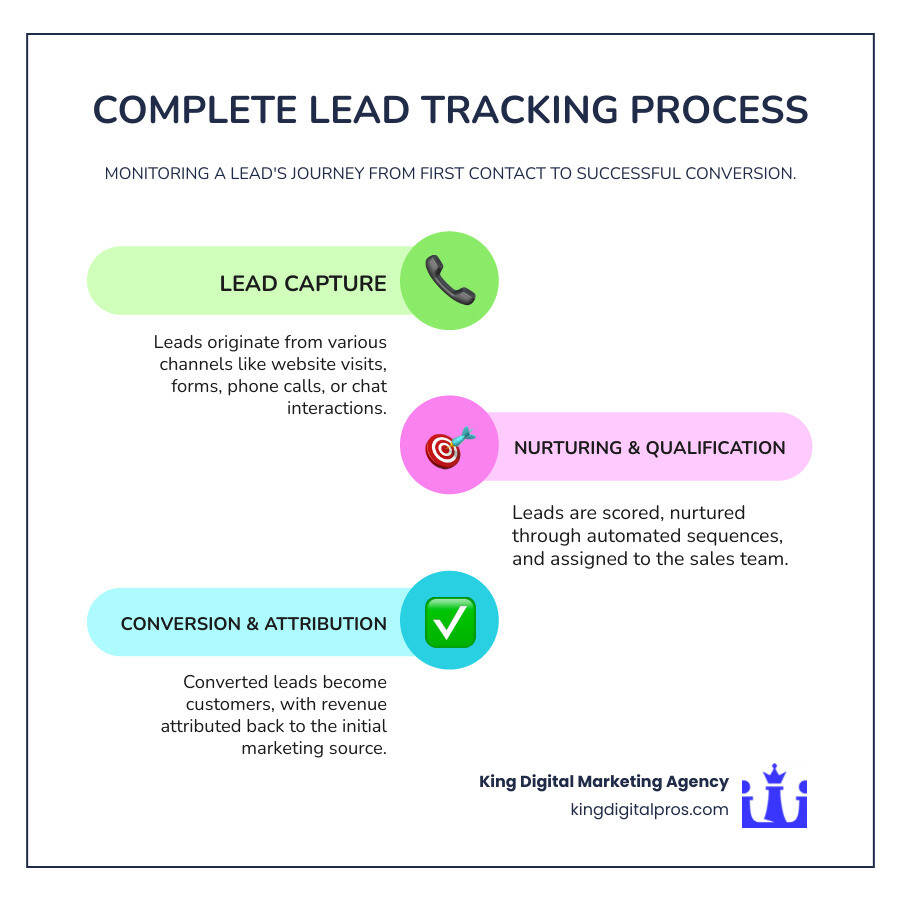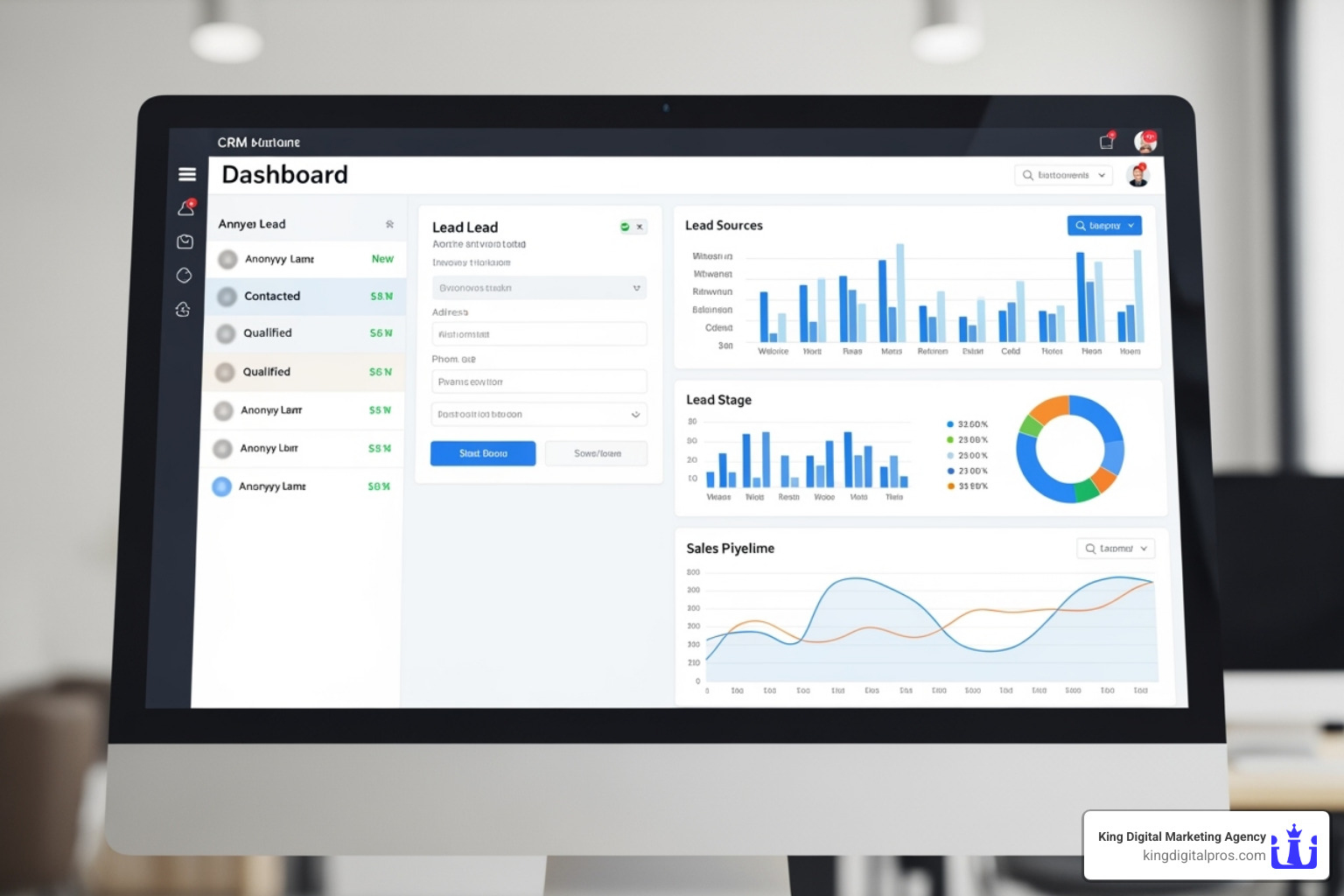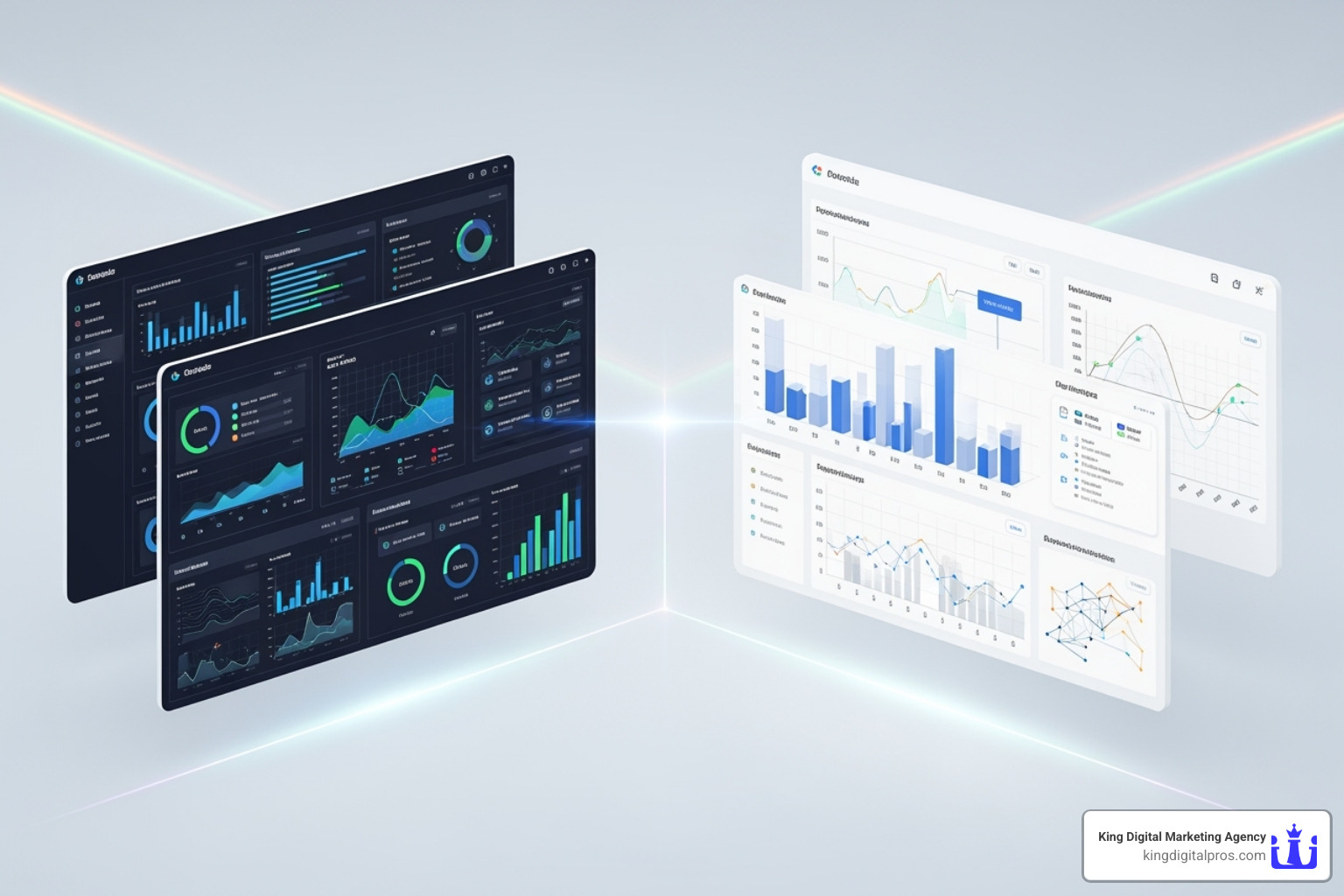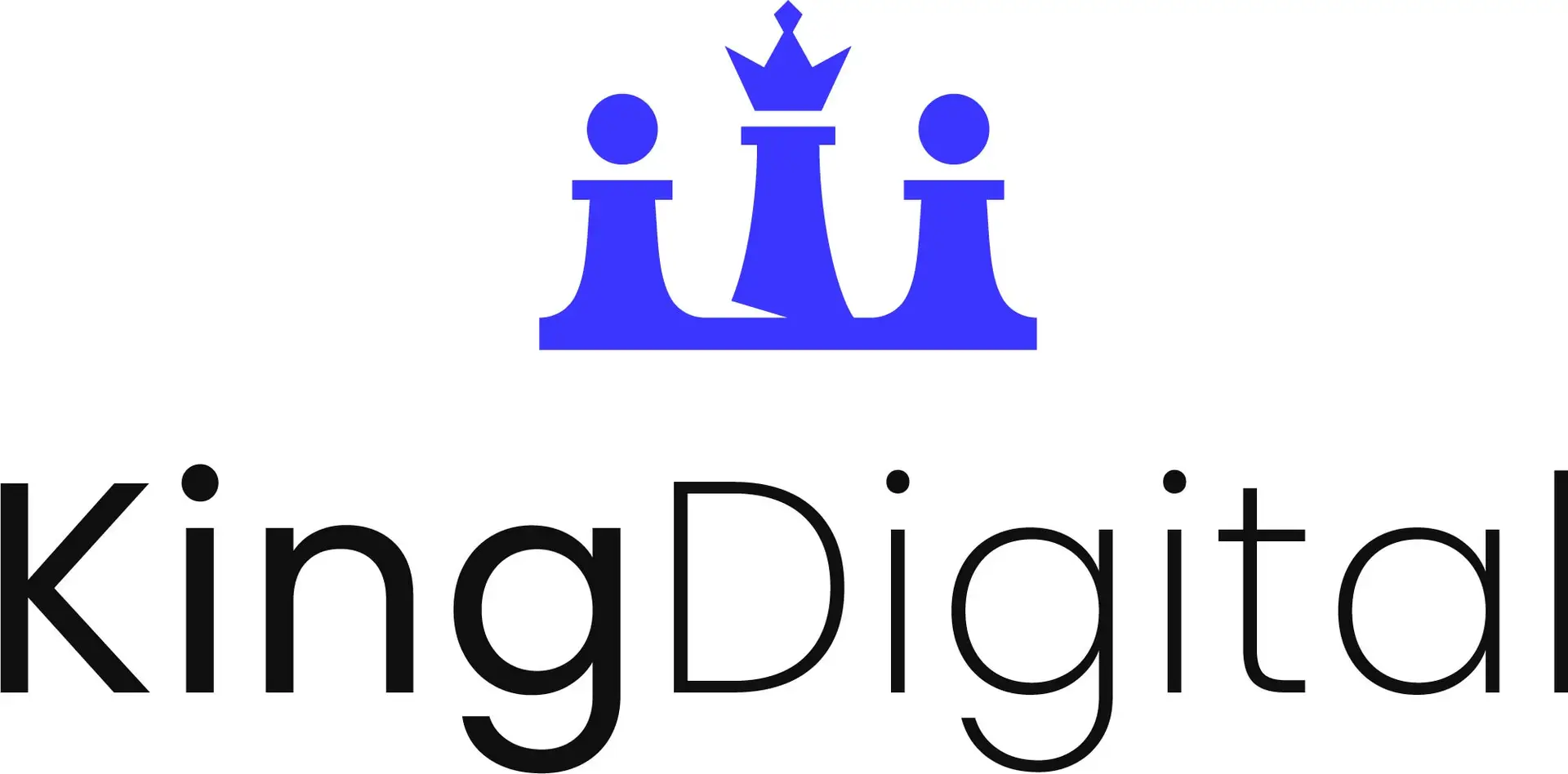Why Lead Tracking Services Are Critical for Modern Business Growth
Lead Tracking Services are software solutions for monitoring, managing, and analyzing potential customers from first contact to conversion. These systems capture leads across channels, organize prospect data, and reveal which marketing efforts generate the best customers.
Key Components of Lead Tracking Services:
- Lead Capture: Forms, phone calls, chat widgets, and website visitors
- Data Organization: Centralized contact management and lead scoring
- Attribution Tracking: Connecting leads to specific marketing channels
- Automated Follow-ups: Email sequences and task reminders
- Performance Analytics: Conversion rates, ROI measurement, and pipeline reporting
The lead management market is projected to hit $5.1 billion by 2030, reflecting its immense value. Companies using this software see 10-15% higher conversion rates and generate 50% more sales-ready leads at a 33% lower cost.
For local businesses struggling with scattered customer information, lead tracking creates order from chaos. It eliminates guesswork about lead origins and prevents lost sales from poor follow-up, providing clear visibility into the sales pipeline and marketing performance.
As Bernadette King, founder of King Digital Marketing Agency, I’ve helped countless local businesses transform their customer acquisition through strategic implementation of Lead Tracking Services, turning confused marketing efforts into predictable revenue streams. My experience building and scaling multiple businesses has shown me that the right tracking system becomes the foundation for sustainable growth.

Core Functionalities & Key Features of Lead Tracking Software
Juggling sticky notes, emails, and memories to track customer information is chaotic and inefficient. Lead Tracking Services solve this by centralizing all prospect data into a single, organized system, making them a game-changer for businesses of all sizes.

This process begins with data centralization. The software acts as a hub, collecting information from website contact forms, business calls, chat conversations, and social media. All data flows into one accessible location.
Effective contact management builds rich profiles for each prospect, including company details, industry, interaction history, and team notes. This creates a comprehensive record of every customer relationship.
Automated lead assignment routes new leads to the right team member based on predefined rules like location or product interest. This ensures faster follow-ups and connects prospects with the appropriate expert immediately.
With reporting and analytics, you can identify which marketing efforts deliver customers and which are wasting your budget. Data shows that 74% of businesses agree that lead management software significantly improves their sales process. Making decisions based on facts, not hunches, is key to optimizing your strategy.
Modern Lead Tracking Services also offer seamless integrations with email platforms, accounting software, and other business tools, creating a smooth workflow and saving hours of manual data entry.
Essential Features for Effective Lead Tracking Services
Certain features lift a lead tracking system from helpful to essential for business growth.
Lead scoring automatically assigns numerical values to prospects based on their demographics and behavior, such as downloading a pricing guide. This system can improve a team’s accuracy in identifying qualified prospects by up to 30%. For deeper optimization, exploring Lead Scoring Services can dramatically improve your results.
Lead nurturing allows you to segment leads and send personalized content that resonates with their interests. Personalized email campaigns achieve 29% higher open rates and 41% better click-through rates than generic messages.
Automated follow-ups ensure no prospect is forgotten. The system can trigger timed email sequences or create tasks for your sales team based on lead actions, acting as a personal assistant that never misses a follow-up.
Pipeline management provides a visual, bird’s-eye view of your sales process. Drag-and-drop interfaces show where each prospect is, from inquiry to contract, helping you forecast revenue and identify bottlenecks.
Custom reporting lets you create dashboards that track the metrics most important to your business, such as conversion rates by lead source or sales cycle length.
Understanding Online vs. Offline Lead Tracking
Effective Lead Tracking Services must capture the complete customer journey, which often spans both digital and physical touchpoints.
- Online Tracking: This includes website visitor tracking to identify companies browsing your site, form submissions for direct information capture, and chat tracking for real-time conversations.
- Offline Tracking: For local businesses, offline interactions are critical. Call tracking uses unique phone numbers on different marketing materials (e.g., a Google ad vs. a billboard) to attribute calls to the correct source. Tracking in-store visits and event attendees can be done with unique promo codes or by having staff collect contact information.
The goal is to connect these dots to see the complete customer journey and answer the critical question: Is Your Website Converting? alongside all your other marketing efforts.
How Lead Tracking Illuminates the Customer Journey and Marketing ROI
Customers rarely make a purchase on their first interaction. Their journey involves multiple touchpoints, from online research to in-store visits. Lead Tracking Services are essential for mapping and understanding this complex path.

Mapping touchpoints means following the digital trail a potential customer leaves with every interaction. A prospect might see a Facebook ad, visit your website a week later, and then call your business. Without tracking, these events appear disconnected.
Understanding conversion paths reveals valuable patterns. For example, you might find that customers who read your blog posts first are more likely to buy. These insights are gold for refining your marketing strategy.
This leads to marketing attribution models, which assign credit for a conversion to the various marketing touchpoints that influenced the customer.
- First-touch attribution gives 100% of the credit to the first interaction a customer had with your brand. It’s simple but often incomplete.
- Multi-touch attribution is more sophisticated, distributing credit across multiple touchpoints that influenced the sale. This model provides a more realistic view of what drives conversions.
The ultimate goal is demonstrating ROI and ROAS (Return on Ad Spend) with hard numbers. Instead of guessing, you can state with confidence which marketing campaigns are profitable, changing marketing from an expense into a measurable investment.
Companies that master lead nurturing generate 50% more sales-ready leads at 33% lower costs. When you understand your Digital Marketing Conversion Rate through comprehensive tracking, you can optimize every step of your funnel. For B2B companies, exploring proven B2B Lead Generation tactics can provide additional strategic insights.
Modern Lead Tracking Services automate this process, presenting clear reports that show which marketing efforts generate the best returns. This visibility allows you to double down on what works and eliminate what doesn’t, moving from guesswork to precision.
A Comparative Guide to Choosing Your Lead Tracking Services
Choosing the right Lead Tracking Services involves understanding two main categories: all-in-one CRM platforms and specialized tracking tools. Each has distinct strengths and is suited for different business needs.

All-in-one CRM platforms are comprehensive solutions that bundle lead management, sales automation, customer service, and marketing. They are ideal for businesses wanting a single, unified system where all customer data resides in one place. However, their complexity and cost can be a hurdle for smaller businesses, as they may include features you don’t need immediately.
Specialized tracking tools are laser-focused on a single function, such as call tracking or website visitor identification. They excel at one specific task and are often praised for their ease of implementation and cost-effectiveness. The main drawback is the potential for a fragmented system, requiring you to manage multiple tools and piece together data from different sources.
When evaluating options, consider these factors:
- Pricing Models: These vary from free starter plans to tiered pricing based on features, users, or lead volume. Look for transparency to avoid hidden costs.
- Ease of Use: The best system is one your team will actually use. Prioritize clean interfaces and logical workflows.
- Customer Support: Responsive support is critical when issues arise that could impact sales.
- Scalability for Growth: Choose a solution that can grow with your business to avoid a difficult migration later. This is a key consideration when selecting any Lead Manager Software for your business.
Integrating Your Lead Tracking Services with Other Platforms
True efficiency is achieved when your Lead Tracking Services communicate with your other business tools.
CRM integration is the top priority. Lead data – calls, forms, and site visits – should flow automatically into your CRM to create a 360-degree customer view for your sales team.
Email marketing integration enables automated nurturing. For example, a prospect downloading a pricing guide could trigger a specific follow-up email sequence.
Sales platforms integration streamlines the sales workflow, allowing reps to manage tasks from a single interface with automatic logging, which is crucial for effective Sales Lead Management.
API access offers limitless customization, allowing you to connect your lead tracking software to other tools like project management systems using services like Zapier.
Marketing automation platforms use the rich data from your tracking system to score leads, trigger campaigns, and predict which prospects are most likely to convert.
The key is to choose Lead Tracking Services that integrate well with your existing technology stack. The more seamless the connections, the more time you can spend with customers.
Navigating Privacy, Cookies, and the Future of Lead Tracking

The landscape of Lead Tracking Services is evolving due to new privacy laws and the phasing out of third-party cookies. This shift requires an adaptation toward more transparent, trust-based marketing practices.
Regulations like GDPR (General Data Protection Regulation) in Europe and CCPA (California Consumer Privacy Act) give individuals more control over their personal data. For lead tracking, this means you must be transparent about what data you collect and why, and provide clear opt-out and data deletion options. Your privacy policy must be easily understandable to your audience.
The third-party cookie deprecation by major browsers like Chrome marks a significant change. Traditional cross-site tracking is becoming less effective, pushing businesses to adapt their strategies.
To adapt, focus on these key areas:
-
First-Party Data Strategies: This is the new gold standard. It involves collecting data that customers willingly share on your own platforms, such as through form submissions or newsletter subscriptions. This data is more reliable, accurate, and collected with explicit consent.
-
Server-Side Tracking: This method sends data directly from your website’s server to your analytics tools, bypassing browser-side restrictions. It offers greater control and accuracy, as it is not affected by cookie-blocking technologies.
-
Consent Management: Using consent management platforms is now essential. These tools help you clearly communicate your data collection practices to visitors and allow them to provide explicit consent. This is not just about compliance; it’s about respecting your audience. Resources like OneTrust’s cookie consent solutions can help with proper implementation.
The future of Lead Tracking Services is moving toward a model where businesses earn data by building valuable relationships, rather than relying on covert tracking. Companies that accept transparency and prioritize user consent will build stronger, more trusting connections with their customers, creating a better foundation for long-term growth.
Frequently Asked Questions about Lead Tracking
Here are answers to some of the most common questions business owners have about implementing Lead Tracking Services.
What is the difference between lead management and a CRM?
It’s common to confuse lead management and CRM, but they serve different, albeit related, purposes.
Lead management is a specialized function, often housed within a CRM, that focuses on the early stages of the customer journey: attracting potential customers, capturing their data, and nurturing them until they are qualified to speak with sales.
A CRM (Customer Relationship Management) system is a broader tool for managing the entire customer lifecycle, from that initial lead all the way through to purchase, service, and long-term retention.
In short, lead management is a process focused on new prospects, while a CRM is the comprehensive system that manages all customer relationships. Both work together to grow revenue.
How do you track offline leads like phone calls or walk-ins?
Tracking offline leads is crucial for local businesses, and several effective methods exist.
-
Dynamic call tracking numbers assign unique phone numbers to different marketing campaigns (e.g., a Google Business Profile, a billboard, a radio ad). When a number is called, the system attributes the lead to the correct source. Many systems also offer call recording for training and quality assurance.
-
Unique promo codes are effective for print, direct mail, or broadcast advertising. When a customer uses a code like “RADIO20,” you know exactly where the lead originated.
-
Manual entry in your CRM is essential for walk-ins and referrals. Train your staff to consistently ask, “How did you hear about us?” and enter the information into the CRM, often via a mobile app for convenience.
The key is to make data collection a consistent habit at every point of sale.
Is free lead tracking software good enough to start with?
Free lead tracking software can be a good starting point, but it’s important to be aware of its limitations.
The Good: Free versions typically offer basic features like contact management and simple lead capture forms. This is often enough to get organized and demonstrate the value of tracking leads.
The Limitations: You will likely encounter limitations on the number of contacts, a lack of automation features, and basic reporting that doesn’t offer deep insights. Advanced features like lead scoring and detailed attribution are almost always reserved for paid plans.
When to Upgrade: Free software is an excellent way to build good habits. It’s time to upgrade when you hit contact limits, spend too much time on manual tasks that could be automated, or need more advanced analytics to optimize your marketing spend. Most platforms are designed to scale, allowing you to start free and upgrade as your business grows.
Conclusion: Making the Right Choice for Your Business
As we’ve explored, Lead Tracking Services fundamentally change how businesses nurture potential customers. By implementing the right tracking system, you can eliminate guesswork about lead origins and prevent prospects from being lost due to poor follow-up.
The key benefits are clear: centralized data management creates order, automated processes ensure consistent follow-up, and detailed customer journey mapping reveals which touchpoints drive conversions. Most importantly, these services provide the concrete data needed to prove marketing ROI and make informed investment decisions.
For local business owners, this clarity is transformative. Instead of spreading marketing dollars thin and hoping for results, you can see precisely which efforts – from a Google Business Profile call to a website form – bring in your most valuable customers.
The importance of taking a strategic approach cannot be overstated. Choosing the right platform, navigating privacy regulations, and ensuring proper integrations all require careful consideration. The right choice depends on your business size and goals, but implementing some form of lead tracking is no longer optional in today’s competitive landscape.
At King Digital Marketing Agency, we understand that every business’s lead tracking needs are unique. Our expertise lies not just in the technical implementation, but in creating systems that work for real businesses with real challenges. We’ve seen how the right tracking setup becomes the foundation for sustainable, predictable growth.
Ready to transform your customer acquisition from guesswork into a strategic advantage? Let us help you Attract More Customers with a system designed specifically for your business needs.
Take the next step with our professional Lead Tracking Services and find what clarity in your sales pipeline can do for your bottom line.

